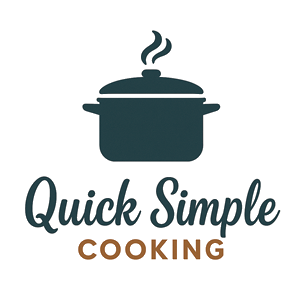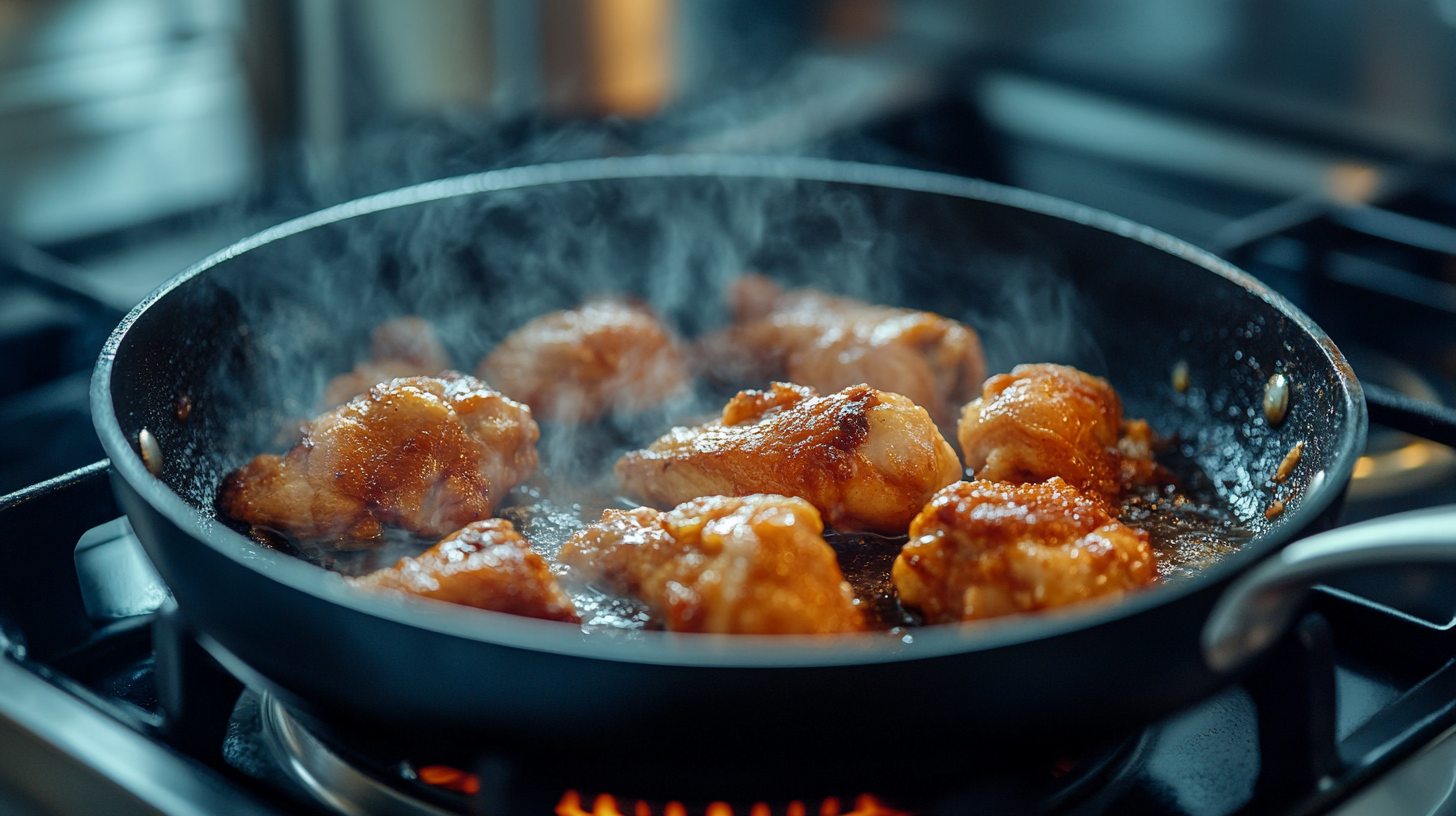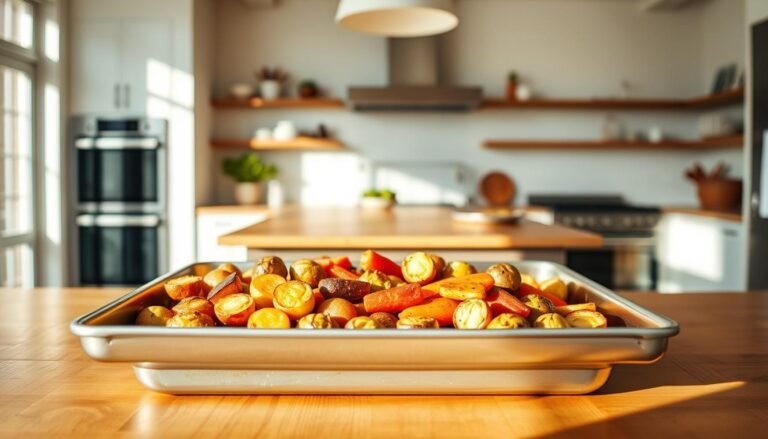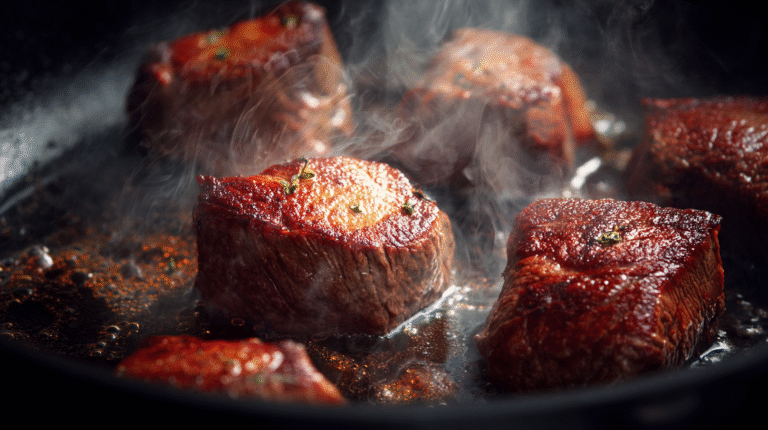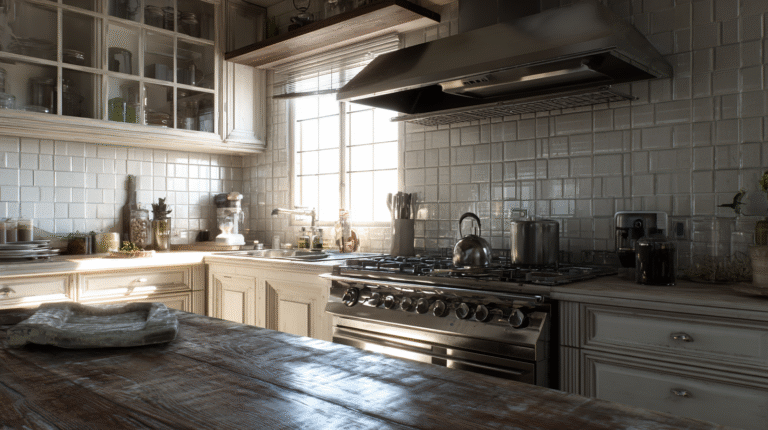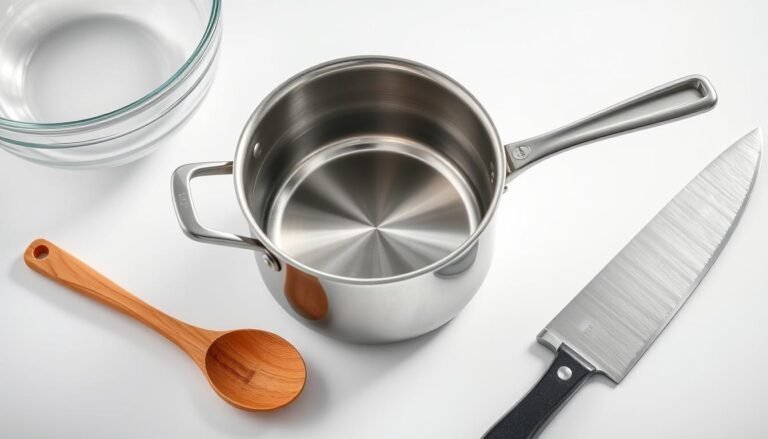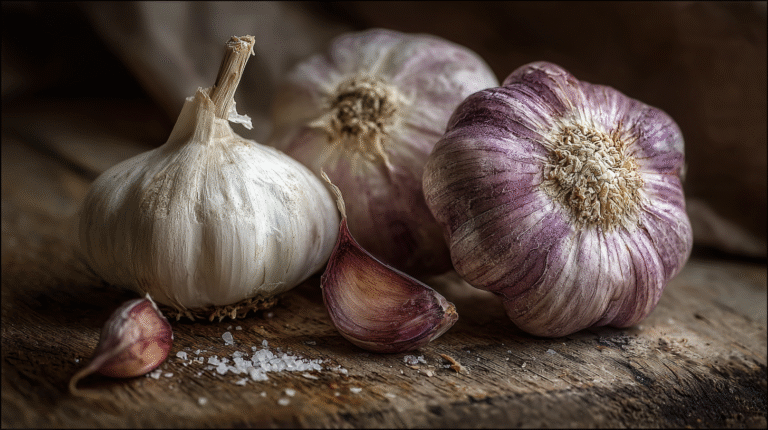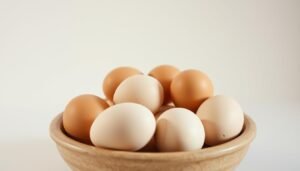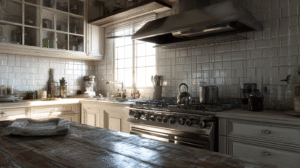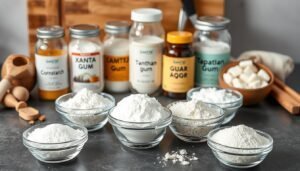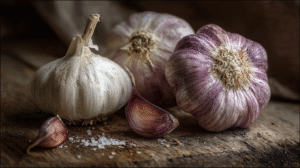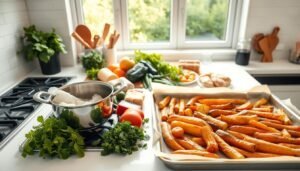Disclosure: This Post Contains Affiliate Links; We earn a commission on purchases.
Cooking chicken can seem hard, but with the right methods, it’s easy to make it succulent. Chicken breast is a favorite in many dishes. When cooked right, it’s a real treat.
Mistakes in the kitchen can make chicken dry and tasteless. But, with chicken cooking tips, you can prevent dry chicken. This way, you’ll get a delicious dish every time.
Key Takeaways
- Mastering the art of cooking chicken can elevate your culinary skills.
- Understanding the right techniques is key for juicy chicken.
- Simple tips can help you cook chicken to perfection.
- Avoiding overcooking keeps the chicken’s natural flavors.
- With practice, you can become good at cooking chicken.
Understanding Why Chicken Gets Overcooked
Overcooking chicken can be avoided by understanding cooking proteins and debunking myths. Many home cooks overcook chicken out of fear of food safety. But, this fear is not necessary.
The Science Behind Protein Cooking
Chicken cooks by changing its protein texture. This starts at 140°F (60°C). By 165°F (74°C), the proteins are fully changed. Knowing this helps cooks make chicken just right.
For more tips on cooking chicken perfectly, see this guide on smoking whole chicken.
Food Safety Concerns That Lead to Overcooking
Food safety worries often cause chicken to be overcooked. People fear undercooking and illness, so they cook it too long. But, a thermometer can ensure chicken is cooked safely without drying it out.
Carry-over cooking also affects chicken’s final temperature. It’s important to understand this.
Common Misconceptions About Chicken Doneness
Many think chicken must be dry and white to be safe. But, this isn’t true. Chicken is safe at 165°F (74°C). Using a thermometer and knowing about carry-over cooking helps make chicken moist and safe.
By using cooking techniques for moist chicken, like brining and controlling temperature, cooks can make perfect chicken every time.
Common Mistakes That Result in Dry Chicken
Looking for juicy chicken recipes can be tricky. Many home cooks make mistakes that make chicken dry. Knowing these mistakes helps cook chicken just right.
Cooking at Temperatures That Are Too High
Cooking chicken too hot makes it dry. High heat cooks the outside too fast. This leaves the inside not cooked enough. To fix this, control the heat and cook evenly.
Neglecting to Use a Meat Thermometer
A meat thermometer is key for chicken. Without it, chicken can be under or overcooked. It makes sure chicken is safe to eat at 165°F (74°C). Using a thermometer is a best way to cook chicken right.
Improper Preparation Techniques
Bad prep can also make chicken dry. Not letting chicken warm up and overcrowding pans are mistakes. Warming chicken and cooking in batches helps it cook better.
Failing to Rest the Meat After Cooking
Not resting chicken after cooking is another mistake. Resting lets juices spread, making chicken tender. Let chicken rest for 5-10 minutes before eating to keep it juicy.
How to Stop Overcooking Chicken: Essential Techniques
Cooking chicken right is all about using the right techniques. This keeps it juicy and tender. Whether you’re new to cooking or have lots of experience, knowing these methods can make a big difference.
Brining and Marinating: Your Secret Weapons
Brining and marinating are great ways to keep chicken moist and tasty. Brining means soaking the chicken in saltwater before cooking. This helps keep moisture in and adds flavor. Marinating involves soaking the chicken in a mix with acids like vinegar or lemon juice. It tenderizes the meat and adds more flavor.
Proper Temperature Control Methods
It’s key to control the chicken’s cooking temperature for tender results. Using a thermometer is the best way to check the chicken’s internal temperature is 165°F (74°C). But, not everyone has a thermometer. So, it’s good to know other ways to check if it’s done.
Testing for Doneness Without a Thermometer
While thermometers are the most reliable, there are other ways to check chicken. One way is to cut into the thickest part of the breast or thigh. If the juices are clear, it’s likely done. Another way is to feel the chicken; it should feel firm when cooked.
Timing Guidelines for Different Cuts
Each chicken cut cooks differently. Knowing these times helps avoid overcooking. For example, boneless, skinless chicken breasts cook fast, usually in 20-30 minutes at 375°F (190°C). But thighs and drumsticks take longer.
By using these techniques, you can cook chicken perfectly every time. Whether it’s for yourself or a big group, tender and juicy chicken always impresses.
Perfect Chicken by Cooking Method
Whether you’re baking, grilling, or slow cooking, the right technique is key. Different methods need specific approaches for moist and flavorful chicken.
Baking and Roasting Techniques
Baking and roasting give chicken a crispy outside and juicy inside. Preheat your oven right and don’t overcrowd the baking sheet. For more tips, check out slow-baked chicken breast recipes. Brining the chicken before baking boosts moisture and flavor.
Grilling Without Drying Out
Grilling chicken can be tricky to avoid dry meat. Oil the grates to prevent sticking and cook over medium heat. A meat thermometer ensures the chicken is cooked right without overcooking.
Pan-Searing for Juicy Results
Pan-searing cooks chicken quickly with a crispy crust and tender inside. Cook over medium-high heat and don’t overcrowd the pan. A bit of oil or butter adds flavor and a golden crust.
Slow Cooking and Poaching Methods
Slow cooking and poaching make chicken moist. Slow cooking in a crockpot or slow cooker cooks the chicken tender. Poaching in liquid at low temperature keeps moisture and flavor.
Air Fryer and Instant Pot Approaches
Modern appliances like air fryers and Instant Pots make cooking chicken easy. Air fryers cook crispy chicken with less oil. Instant Pots cook chicken fast and keep it moist with pressure cooking.
Conclusion: Enjoying Perfectly Cooked Chicken Every Time
Learning to cook chicken perfectly is easy. Just avoid common mistakes and use the right techniques. This way, you’ll get juicy and tasty chicken every time.
Start by remembering the key steps like brining, marinating, and controlling the temperature. These chicken cooking tips will make your juicy chicken recipes a hit with everyone.
Don’t forget, practice and patience are important. Try different ways to cook chicken, like baking, grilling, or pan-searing. See what works best for you.
Follow these tips and keep practicing. Soon, you’ll be making perfectly cooked chicken every time. It doesn’t matter if you’re a pro or just starting out. These techniques will help you get great results.
FAQ
What is the best way to prevent overcooking chicken?
Using a meat thermometer is key. It makes sure the chicken is cooked right.
How can I keep chicken moist while cooking?
Brining, marinating, and not overcooking are important. Letting the chicken rest also helps keep it juicy.
What internal temperature should chicken be cooked to?
Chicken needs to be at least 165°F (74°C) to be safe.
Can I cook chicken at a lower temperature for a longer period?
Yes, cooking chicken slowly helps keep it moist. It’s a good way to make it tender.
How do I know if chicken is cooked without a thermometer?
Check by cutting into the thickest part. If juices are clear, it’s done. But a thermometer is best.
What are some common mistakes that lead to dry chicken?
Mistakes include high temperatures and not using a thermometer. Also, bad preparation and not resting the chicken.
Is it better to cook chicken in the oven or on the grill?
Both methods work well. The trick is to control temperature and time. Oven roasting keeps moisture, while grilling adds flavor.
How can I achieve juicy chicken when pan-searing?
For juicy chicken, don’t overcrowd the pan. Cook at the right temperature and don’t overcook. Resting the chicken also helps.
Can slow cooking help prevent overcooking chicken?
Yes, slow cooking is great. It cooks chicken low and slow, making it tender and moist.

With over a decade of experience turning everyday ingredients into reliable, crowd-pleasing meals, Ryan knows firsthand the frustration of wasting time and effort in the kitchen. He specializes in clear, no-fuss guidance—breaking down techniques, time-saving tips, and smart shortcuts so that even complete beginners feel empowered and confident.
Subscribe to Our Newsletter
